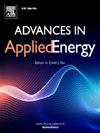Transforming building retrofits: Linking energy, equity, and health insights from The World Avatar
IF 13.8
Q1 ENERGY & FUELS
引用次数: 0
Abstract
The upgrading of energy-inefficient buildings is a critical part of the energy transition. Holistic analyses that foster informed and equitable policy interventions require interoperable data. We apply a principled approach that leverages The World Avatar to create a virtual knowledge graph underpinned by machine-understandable data representations. This approach provides a common terminology to integrate heterogeneous data sources to support multi-scale analysis of building energy retrofit options. We consider a case study in the UK based on the holistic analysis of household-level energy performance data, public health statistics and socio-economic metrics across geographic hierarchies. The analysis identifies regions with critical retrofit necessities, revealing disparities between these imperatives and extant policy levers. Granular retrofit targets are proposed to optimise resource allocation to the most vulnerable areas. Bespoke retrofit strategies are developed for 14.4 million households in the UK, providing actionable insights to support the targeted application of ‘fabric-first’ or ‘system-led’ retrofit pathways.
改造建筑:从世界化身链接能源,公平和健康见解
节能建筑的改造是能源转型的重要组成部分。促进知情和公平的政策干预的整体分析需要可互操作的数据。我们采用了一种原则性的方法,利用The World Avatar来创建一个虚拟的知识图谱,该图谱以机器可理解的数据表示为基础。这种方法提供了一个通用的术语来集成异构数据源,以支持建筑能源改造方案的多尺度分析。我们考虑了一个案例研究在英国基于家庭层面的能源绩效数据,公共卫生统计和跨地理层次的社会经济指标的整体分析。该分析确定了具有关键改造需求的地区,揭示了这些需求与现有政策杠杆之间的差异。提出了细化改造目标,以优化资源分配到最脆弱的地区。为英国1440万户家庭开发了定制改造策略,提供了可操作的见解,以支持“织物优先”或“系统主导”改造途径的目标应用。
本文章由计算机程序翻译,如有差异,请以英文原文为准。
求助全文
约1分钟内获得全文
求助全文

 求助内容:
求助内容: 应助结果提醒方式:
应助结果提醒方式:


